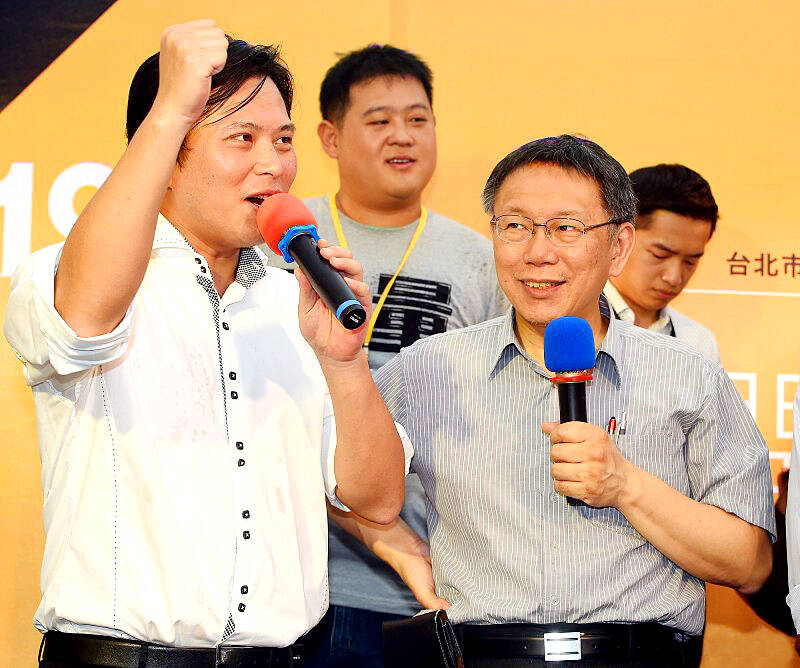Former New Power Party (NPP) legislator Huang Kuo-chang (黃國昌) on Thursday announced that he had filed the necessary documents to join the Taiwan People’s Party (TPP), which is set to nominate him as a legislator-at-large candidate.
Huang announced his decision in a letter to his colleagues at the Taiwan Anti-corruption and Whistleblower Protection Association, which he cofounded, saying he identifies with Ko’s vision of forming Taiwan’s first coalition government.
Huang and TPP Chairman Ko Wen-je (柯文哲) appeared on Thursday night on a livestreamed program hosted by influencer Holger Chen (陳之漢), during which Ko said he would like to recruit Huang and put him on the TPP’s list of legislator-at-large nominees, to be unveiled tomorrow.

Photo: Taipei Times
Ko said he stumped for Huang when he was campaigning for a legislative seat in New Taipei City’s Sijhih District (汐止) in 2016.
“He’s the man,” Ko said, praising Huang’s ability to discover corruption in his former capacity as a legislator.
Huang said during the show that he supported the idea of a coalition government as he is against the over-concentration of political power, which he said has been a hallmark of the Democratic Progressive Party (DPP) administration over the past seven years.
He said after the student-led Sunflower movement against the Cross-Strait Service Trade Agreement in 2014 turned into a brutal crackdown on protesters, DPP politicians promised to work to abolish the Assembly and Parade Act (集會遊行法) and push through a cross-strait agreement supervisory act, promises that have still not been realized.
“Any administration, DPP or Chinese Nationalist Party (KMT), needs effective checks and balances, without which there will be an over-concentration of power, which is what we are witnessing now,” Huang said.
Earlier in the day, the New Power Party, which Huang cofounded, said in a statement that it had received Huang’s application to renounce his membership.
Fellow Sunflower movement leader Lin Fei-fan (林飛帆) on Facebook yesterday said he was not surprised by Huang’s decision, “but more than that, I am sad for him.”
“Of course, it is equally inconceivable to me that he would stand with the KMT and TPP in advocating the reopening of the service trade agreement” or supporting the so-called “1992 consensus,” said Lin, who until recently was the DPP deputy secretary-general.
Ko earlier this year proposed restarting talks on the service trade agreement, despite also participating in Sunflower movement protests at the time.
“Protecting Taiwan from Chinese annexation is the reason we came together,” Lin said. “Ten years later, defending Taiwan is still the most important thing.”
Additional reporting by Kayleigh Madjar

‘DENIAL DEFENSE’: The US would increase its military presence with uncrewed ships, and submarines, while boosting defense in the Indo-Pacific, a Pete Hegseth memo said The US is reorienting its military strategy to focus primarily on deterring a potential Chinese invasion of Taiwan, a memo signed by US Secretary of Defense Pete Hegseth showed. The memo also called on Taiwan to increase its defense spending. The document, known as the “Interim National Defense Strategic Guidance,” was distributed this month and detailed the national defense plans of US President Donald Trump’s administration, an article in the Washington Post said on Saturday. It outlines how the US can prepare for a potential war with China and defend itself from threats in the “near abroad,” including Greenland and the Panama

A wild live dugong was found in Taiwan for the first time in 88 years, after it was accidentally caught by a fisher’s net on Tuesday in Yilan County’s Fenniaolin (粉鳥林). This is the first sighting of the species in Taiwan since 1937, having already been considered “extinct” in the country and considered as “vulnerable” by the International Union for Conservation of Nature. A fisher surnamed Chen (陳) went to Fenniaolin to collect the fish in his netting, but instead caught a 3m long, 500kg dugong. The fisher released the animal back into the wild, not realizing it was an endangered species at

The Chinese Nationalist Party (KMT) is maintaining close ties with Beijing, the Democratic Progressive Party (DPP) said yesterday, hours after a new round of Chinese military drills in the Taiwan Strait began. Political parties in a democracy have a responsibility to be loyal to the nation and defend its sovereignty, DPP spokesman Justin Wu (吳崢) told a news conference in Taipei. His comments came hours after Beijing announced via Chinese state media that the Chinese People’s Liberation Army’s Eastern Theater Command was holding large-scale drills simulating a multi-pronged attack on Taiwan. Contrary to the KMT’s claims that it is staunchly anti-communist, KMT Deputy

The High Prosecutors’ Office yesterday withdrew an appeal against the acquittal of a former bank manager 22 years after his death, marking Taiwan’s first instance of prosecutors rendering posthumous justice to a wrongfully convicted defendant. Chu Ching-en (諸慶恩) — formerly a manager at the Taipei branch of BNP Paribas — was in 1999 accused by Weng Mao-chung (翁茂鍾), then-president of Chia Her Industrial Co, of forging a request for a fixed deposit of US$10 million by I-Hwa Industrial Co, a subsidiary of Chia Her, which was used as collateral. Chu was ruled not guilty in the first trial, but was found guilty